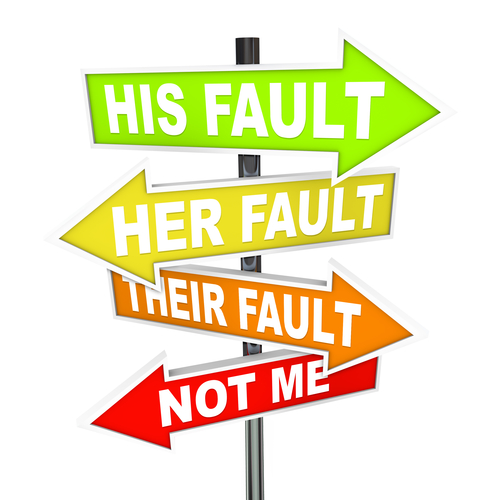Millennials Made Us Do It – and Other Blame Games
I had a great conversation with my Millennial nieces this past week. We talked about the perception of how Millennials were ruining the world as we knew it. Specifically, we were talking about how big shopping malls were changing because of online shopping and the trends toward smaller boutiques.
I’m pretty sure Millennials are not the sole cause of the downfall of malls or life as we know it – in fact, I’m fairly confident. However, there are several parts of our world that are changing because of technology, and Millennials are more comfortable with the newer options than some other generations thus they take the blame. The result has been a finger-pointing accusation between generations that rivals any sibling shouting, “It’s his fault!”
The oversimplifying of the blame process is not a new phenomena. We can name many events in history where people say this one thing caused this event, but the reality is, there’s a lot at play in each of the scenarios. For example, I grew up learning the downfall of Rome was because family structures fell apart. While that may have contributed to the chaos of the era, there was more to the downfall of Rome than that.
My example about Rome is clear example of why blame is an easy answer for us. It allows us to simplify and compartmentalize the problem and address it in a way that fits our own beliefs and structures. However in our everyday problems the simplification process removes any personal responsibility we may have had in the event.
Here’s a common one: I wasn’t offered the job because the new boss doesn’t like me. Blame says it’s the boss’ fault. Blame doesn’t make room for us to explore what we might be doing that kept us from not getting the job.
It’s important we get to the point of being able to examine our own behaviors considering different outcomes. Unfortunately that takes some skills most of us aren’t trained to use (Remember Rome? It was such an easy answer.).
Here are some questions to get us started in shifting things from the blame game:
1) Ask yourself what other causes or outcomes may be at play, even if they feel ludicrous. Even being able to ask the question and come up with alternatives let’s you see things differently.
2) Try putting yourself in the other person’s shoes. What do you think their thought process was?
3) Assume the best of others. Rarely do people wake up and think, “I can’t wait to be a jerk today!” yet we assume their actions reflect that attitude. When we assume the best, we come up with different versions of what might be a painful situation.
Next time you drive by the mall, remember it’s easy to point fingers and blame others. It’s rarely easy to see things differently, but it’s a skill that will take you far in your relationships and in your ultimate success.
Keynote speaker, trainer, and consultant, Sarah Gibson, helps organizations leverage the power of communication, teamwork and diversity to improve engagement and transform teams. To buy her book or inquire about her speaking programs, please visit www.sarahjgibson.com.



